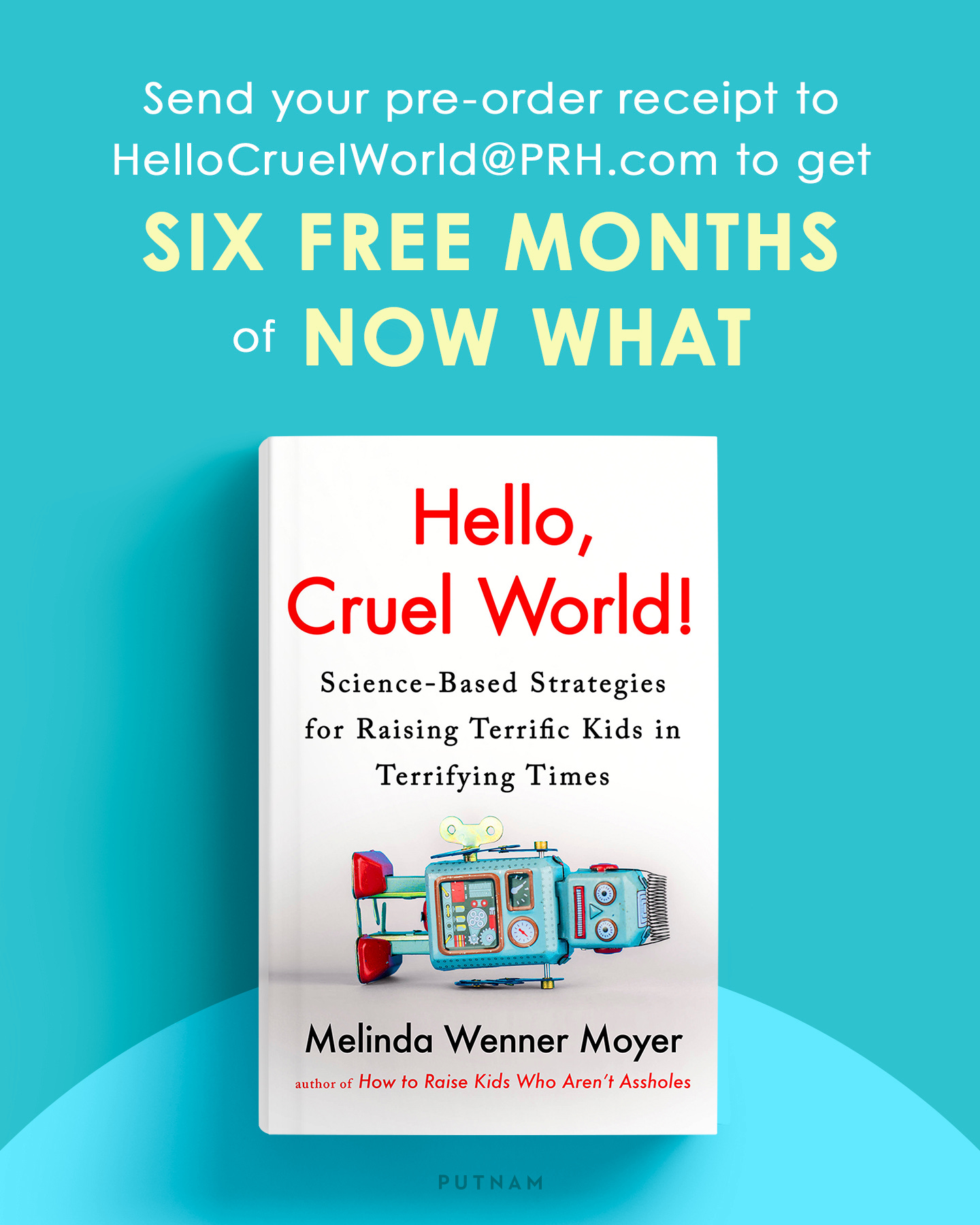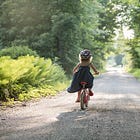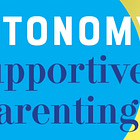A Simple Way to Stop Overparenting
Ask yourself one little question.
A quick note before I dig into today’s topic: I’m super excited that psychologist and bestselling author Adam Grant included my book in his Substack roundup this week, “11 New Books to Brighten Your Spring,” alongside new books by Maggie Smith, Melinda Gates, and Susan Dominus (!!! omg what company!!!). In his words: “One of my favorite voices on parenting delivers an evidence-based, practical manual for nurturing resilience, kindness, critical thinking, and well-being in kids.” Thank you, Adam!
It would mean so much to me if you pre-ordered Hello, Cruel World! And if you send your pre-order receipt to HelloCruelWorld@PRH.com, you’ll get six free months of paid content to Now What. You can pre-order from any bookstore but if you pre-order from my local bookstore Split Rock Books, you can request that your copy be signed and personalized, too.
If there’s one thing modern culture tells us about parenting, it’s that more is always better. Intensive parenting norms encourage and expect us to be highly involved in our children’s lives — to meddle, to curate, to optimize.
And yet, the research tells us that less is often more when it comes to what’s actually best for us and our kids. Among other things, helicopter parenting and snowplow parenting are associated with less self-regulation, self-control, and persistence in kids and with higher rates of depression in young adults. On the flip side, autonomy-supportive parenting — an approach in which parents are more hands off — has been tied to better kids’ social adjustment, academic achievement, emotional health, and self-regulation, among other things.
But even when we know this, it can still be hard to let go and step back. I’m deeply familiar with the research and what it says, and yet I still find myself meddling when I probably shouldn’t be.
So how can we turn off the instinct to overparent? A new study suggests a simple but effective approach. It only requires asking ourselves one question: Could the task my kid is struggling with actually with be a learning opportunity?
The study, which was recently published in the journal Child Development by researchers at Yale and the University of Pennsylvania, started out with an interesting premise: that parents may not always realize how much their children can learn from everyday tasks like getting dressed on their own, cleaning their rooms, packing their lunches, or maneuvering toys or playground equipment.
Sometimes, we may actually think of these tasks as obstacles to learning — or at least, tasks that take our kids away from more “valuable” activities. We might, for instance, clean our kids’ rooms for them so they have more time to play with their siblings or participate in extracurriculars. We might help them get dressed so we can get them to preschool earlier. In these situations, we often, and maybe not even consciously, may be judging kids’ everyday caretaking tasks as unimportant for their development.
In the first part of their study, the researchers tested this notion. They presented 77 parents of 4- and 5-year-olds with hypothetical scenarios in which their child was struggling to complete a task, and asked the parents how likely they were to step in and help their kids in that situation. Some of the scenarios involved academic learning tasks — tracing letters, solving puzzles, sorting objects based on shape — while others were more everyday tasks, such as the child putting on their jacket, cleaning up toys, or brushing their teeth.
The researchers found that parents were indeed more likely to consider academic tasks, rather than everyday tasks, as “learning opportunities” for their kids. And perhaps because of that, they were less likely to step in and help if their kids were struggling during those academic activities.
But the thing is, everyday tasks are also important learning opportunities. Doing them, children learn and strengthen all sorts of skills — gross and fine motor skills, problem-solving, confidence, resilience, and independence. These are arguably the most important skills.
But in the everyday chaos of parenting, it can be hard to remember that.
In the second part of the study, the researchers recruited parents of 4 and 5-year-olds who were visiting a children’s museum. They wanted to see whether parents would be more likely to let kids dress themselves if they framed the dressing as a learning opportunity.
The researchers told the parents and kids that they were going to play a fun game that required the kids to first put on hockey uniforms. Then, they split the families into two groups. They told one group of parents that children can learn key lifelong skills from putting on clothes by themselves, and they told the other half (the control group) that children can more deeply engage with museum exhibits after putting on these clothes.
Then, the researchers had the kids attempt to put on the hockey uniforms in the presence of their parents and watched what happened. They found that parents helped their kids less when they had been told that dressing up independently was a learning opportunity — in fact, the parents who were told this helped their kids half as much as the other parents did.
As the researchers wrote, when parents prioritize what their children can learn from doing everyday tasks, they “step back and let children learn from trial and error.”
This study is a clear illustration of the power of perspective. Although the research involved parents of preschoolers, I think the findings likely apply to parents of older kids, too — because I don’t know about you, but I’m often still inclined to meddle or help my tween and teen do things, whether it’s tidying their rooms, doing their laundry, or making their lunches. It’s easy to overlook the fact that these kinds of activities strengthen key skills, but they absolutely do — and many of these skills are arguably more important than more specific “academic” skill-building tasks.
So the next time I catch myself about to step in and help one of my kids, I’ll ask myself: Could this actually be a learning opportunity for them? Might my child learn something from doing this independently, even if they fumble, struggle, or don’t get it quite right? I find it helps me to step back and remind myself of the end goal of my parenting: to ensure that my kids grow into adults who can function well in this world by themselves. They need to be independent, to have strong problem-solving skills, and to keep trying when things aren’t easy. One of the best ways to get them there is to let them muddle through the everyday tasks of life when they are kids.
What are your thoughts on this study and its implications? Share in the comments!









Do you have advice/articles on what to do when you child is the reincarnation of a 16th century French king and absolutely flabbergasted at not being given a body servant? My kid doesn't want to do anything for himself, and I have yet to figure this out (he's 8), because everyone I ask about it is surprised that kids exist who never went through a "me do it!" phase and has no idea.
I started to cry reading this. I absolutely agree with this approach and my husband and I raised our son this way, stressing independence-self-confidence-being helpful to others.
But.
Are there any studies (I am sure there must be) about how neuroatypical kids learn or do not learn this way? Our just-turned-18 son with ADHD can hardly do anything by himself. His confidence and pride have been on a gradual downward slide for the past five years until BOOM here we are. I did not think this degree of handholding would ever become necessary, much less at this age.
(He was at a Montessori school from 4th-6th grade after being mobbed at the local public school. That was great.)